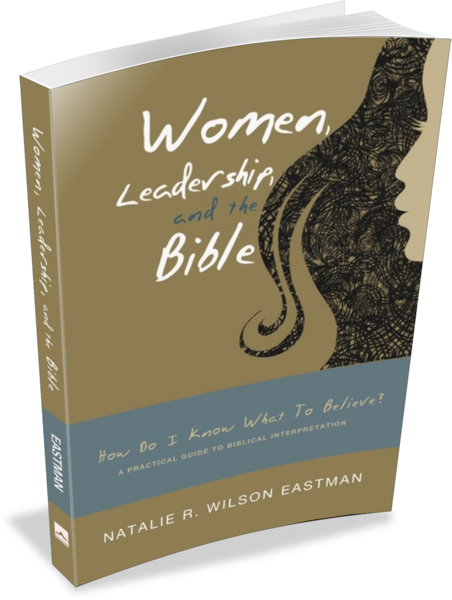Last year, Dr. Natalie Eastman, asked me if I would be interested in reading her new book, Women, Leadership, and the Bible: How Do I Know What to Believe? Indeed, I did want to read it.
It’s hard not to wonder if some of the current conflict swirling around women, leadership, and the church might diminish if we all committed to engaging with Scripture as thoughtfully and soberly as Eastman suggests. She does not tell us what to believe—she tells us how to figure out what we believe by carefully and methodically studying Scripture. In an unusual and impassioned manner, she offers us “a plan, not a position.”
I asked her to explain the purpose of her book.
Dr. Eastman: The term “empowerment,” it seems to me, is vastly overused these days. Yet, admittedly, that’s exactly what I’m doing through WLB! Through equipping women with seminary-level tools by which they can study, understand and interpret the Bible; then, stuffing them full of confidence through constant encouragement that they can do this, I hope to empower them to change from an internal status of paralyzed and possibly ignorant (or simply the feeling that one doesn’t know much or enough) to confident, ready, and trained to engage and effectively apply God’s Word with theological reliability and biblical skill.
Of course I hope this empowers and encourages any Christian wanting to become more grounded in God’s Word, not women only; but my primary mission and calling is to and for women.
On an emotional level, I simply want to tell Christians, especially women, “You can do this.” This is not rocket science. Nor do these abilities rely on a special gifting of the Holy Spirit. These are learned skills. Anyone who puts their mind and effort toward the training can and will learn how to know what the Scriptures are saying, as well as what they’re not saying. They can learn how to filter through the many voices “out there” that interpret God’s Word; how to tell the difference between when someone’s giving their opinion about what God’s Word says and when they’re interpreting; and what to do with the many conflicting opinions and interpretations. It can be done. People do it every day. And you can do it with greater skill and effectiveness, while still being sensitive to and filled with God’s very presence throughout the process.
My next question was, What makes your book different from other books on women’s issues?
Dr. Eastman: Plenty of books espouse one position or another on women’s roles or any other issue, effectively telling women what to think and why to think that. Yet, few teach women to discern God’s messages and desires for his people through systematic, thoughtful, seminary-level analysis. Women, Leadership, and the Bible steps into that void, offering step-by-step, approachable, “non-jargonese,”methodical process of analyzing an issue on many levels: scriptural, academic, spiritual, emotional, community, and personal. The ultimate goal is to equip women (and any men who desire to read it) to thoroughly and effectively investigate God’s Word, along with filtering through various interpretations of it, and subsequently make up their own mind about an issue.
What kind of impact would it have on the church or on individual’s faith if she were to read this book?
Dr. Eastman: Just IMAGINE a world in which Christian women humbly, yet skillfully study Scripture to get clarity on their hardest biblical questions! And imagine women sifting and sorting through all kinds of opinions and interpretations as they study and consider what the Bible’s text says!
True freedom and self-confidence await the woman who engages the material in Women, Leadership, and the Bible. That freedom and confidence come from knowing and understanding not only what she believes, but why she believes what she believes. She will know she has formed her own thoughts, opinions, and interpretations using reliable, tested, and grounded methods, carefully testing her own and her community’s beliefs against Scripture. It is life-changing!
If women can engage their difficult life-issues with competent biblical integrity (and they can!) rather than relying exclusively on emotions, what others say, or the last book they read’s interpretation, as I did for so long, just imagine the difference this will make in their lives, their churches and, yes, the world! Women (and men who learn these skills, too) can feel confidence before God that they are attempting to understand his Word as best they can, as they subsequently seek to follow and obey it.
A few favorite quotes from the book:
“The Bible is our primary determining factor when discerning answers to [our] questions—not our feelings or our experiences.”
“When we love our neighbors as ourselves in every situation, we promote right relationships among people. When we promote right relationships among people, we reflect the love of God. This right-ness causes us, and others around us, to grow, mature, and flourish. therefore, as your examine various interpretations and positions on the question of women’s roles, you might ask, ‘Does this position promote right relationships and human growth and maturity, and encourage the deepening of our relationship with God?'”
If you consider yourself a follower of Christ and feel the desire to go deeper in Scripture, I would highly encourage you to read WLB.
DR. NATALIE R. WILSON EASTMAN (M.Div. ‘02, D.Min. ’05–Gordon-Conwell Theological Seminary) is a freelance writer, editor, and member of the Redbud Writers Guild. She has served as a full-time youth minister to girls and women; Bible study teacher; worship leader and team developer; missionary to east Asia; and retreat and event teacher/speaker. She lives in Delaware, OH, with her husband and three young children. Links to her blogs may be found at natalieeastman.com, and her training and coaching at biblicalbreakthrough.com. You can also follow Dr. Eastman on Twitter (@Natalie_Eastman) or on Facebook.
Enjoy! Check out other book reviews here.
